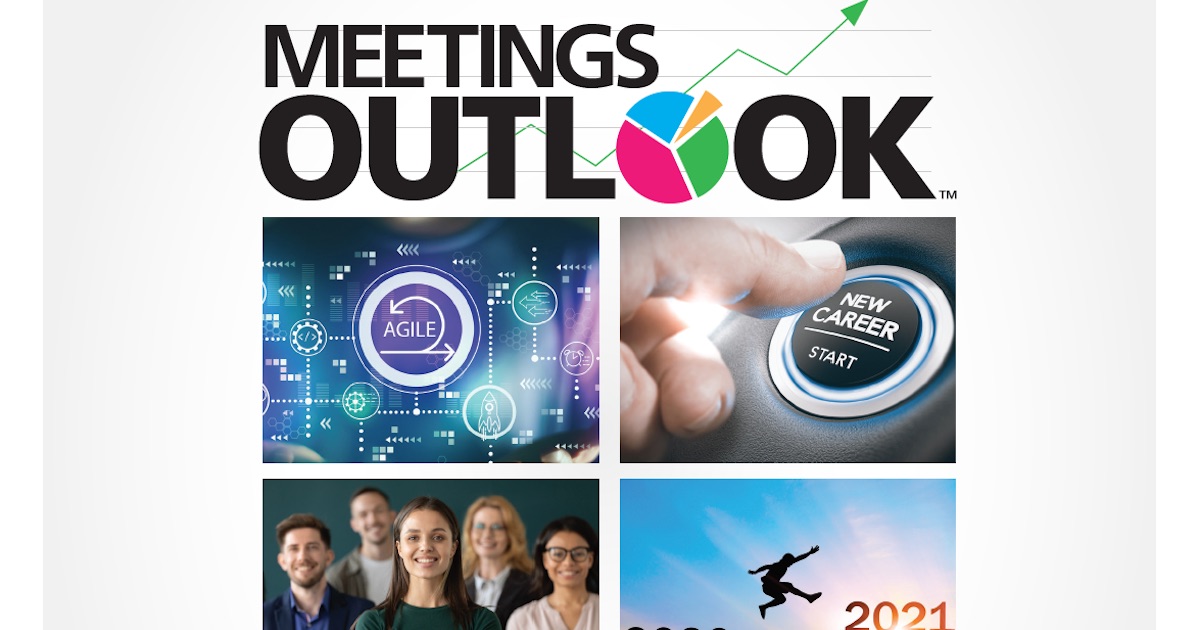Eager and innovative, meeting professionals envision major growth for the year to come for hiring, budgets, attendance and more even as coronavirus variants threaten to sidetrack recovery.
Industry professionals really want to get back to work—that’s one extrapolation based on data from the latest Meetings Outlook survey revealing that vaccination rates among respondents are almost twice that of U.S. and Canadian averages (the countries with the greatest number of respondents in the survey).
More than 91% of respondents are fully or partially vaccinated against COVID-19. Broken down, 84% of respondents say they’re fully vaccinated, 7% claim to be partially vaccinated and less than 4% say they don’t want a COVID-19 vaccine. As of early July, 49% of residents in the U.S. have been fully vaccinated and 53% of Canadians can claim the same.
Over the past few months, face-to-face events have increasingly become a reality; perhaps seeing that has helped to fuel the industry’s record-breaking optimism. An astounding 93% of respondents are projecting favorable business conditions over the next year, making this the second consecutive quarter of record positive expectations. For contrast, last summer, only 36% of respondents were anticipating positive business conditions for the year to come. (Note: This survey closed shortly before many locations began seeing the impact of the coronavirus delta variant.)
Similarly wowing, the percentage of respondents anticipating favorable live attendance over the next 12 months is also at an all-time high (77%), while virtual attendance projections continue to decline as plans shift from virtual to hybrid and face to face.
And the encouraging results continue. More than 81% of respondents said they anticipate holding their next face-to-face event in 2021. In fact, 56% cited Q3 of this year as the timing for such an event, potentially suggesting a swifter return to more normal business. Seventy percent of respondents also anticipate business returning to pre-pandemic levels by the end of next year.
The talent challenge
Just because people are increasingly ready to return to face-to-face meetings and events doesn’t mean it’ll be easy. The human factor will be a significant challenge.
“The most significant trend affecting the meeting and event business is a talent shortage,” says Tracy Judge, CMP, MS, HMCC (MPI San Diego Chapter), founder and chief connector for Soundings Connect. “The length of the pandemic forced many in our industry to find new work or a new career path. There were some industries and companies that did really well during the pandemic. They were able to hire new talent and most can afford to pay more than the events and hospitality industries.”
As industry professionals with major venues and employers have shifted from needing few employees during the worst of the pandemic to having to staff up significantly, quickly, there’s been genuine concern about the inability to fill the needed roles with appropriately skilled workers. Even though 49% of respondents said they are not having difficulty filling job vacancies, 29% answered that they are having such troubles.
Judge doesn’t see this occurring in her own company, but it has affected her business as Soundings Connect matches freelance industry professionals with organizations seeking their unique skills. Accordingly, this year, she anticipates her business will be about four times what it was before the pandemic.
“We know people outsource more during a recession and in this case, it was really drastic, and a lot of people left the market and companies are having trouble finding talent,” Judge says. “Even large companies are coming to us to staff their talent, so that’s one of the reasons why we’re seeing so much growth. We had 350 freelancers pre-pandemic and we have over 1,000 today.”
In addition to losing talent by way of people who may have left the meeting industry during the pandemic for a more regular work schedule or possibly even more money, Judge points to stats showing women left the workforce in larger numbers than men. In fact, numbers from the U.S. Census Bureau released earlier this year revealed that women have accounted for nearly 80% of people who have left the workforce during the pandemic.
“For us, that’s a crazy statistic because 77% of the meetings and events workforce is women,” Judge says. “Additionally, Harvard Business Review published something that two-thirds of highly skilled women said they wouldn’t have exited the workforce had they had more flexibility in their jobs.”
Flexibility is a key trait of meeting professionals and one of the most important traits for organizations during the pandemic, which saw most employees working from home. Many respondents (47%) say their organizations are keeping the option of full-time remote work for new and existing staff—adapting to these challenging times while understanding the wants and needs of employees. (Thirty-one percent said they are not offering full-time remote work; 22% responded “it’s complicated.”)
Judge says one of the barriers that was difficult to break through in the meeting industry was that people have been so used to working together in an office setting, face to face. The pandemic fast-tracked the adoption of regular remote work, which is significant for Judge’s business of placing freelancers.
“COVID really broke down the barriers that freelance talent face as far as plugging in to other organizations—when you’re a freelancer, you don’t have that larger organization that you’re plugging into,” she says. “sOne of the things [organizations] needed to focus on was cultural changes and how they need to change the organization culturally for remote work. The other things were technology that has helped make freelancers more successful, things like Zoom, project management tools… A lot of the things that ended up becoming standard because of COVID are the things that help freelancers be remote. Companies are positioned so much more to use freelance talent now than pre-pandemic.”
Of course, it’s not just freelance or contract hiring facing challenges.
Jill Kopecky (MPI Tennessee Chapter), corporate talent buyer, Neste Live! A Live Nation Company, says finding skilled staff hasn’t been difficult at her company, attributing that to how “Live Nation prides itself on making sure that everyone feels valued as an employee and person. The focus on diversity, education, community service and respect for everyone is at the core of what we do so that appeals to many people. [But] I see my friends that work at hotels, restaurants and bars struggling to find employees and people who want to work. It is very sad.”
So why does she think many in the industry are having trouble acquiring suitable staff?
“There are a few reasons,” she says. “One, people have left the industry and found other work that allows them to stay at home instead of on the road. The desire for a more stable working environment is appealing.”
Kopecky also suspects there are people who don’t want to work any longer and/or are staying out of the workforce because they’re sufficiently concerned about catching COVID-19.
“Finally, people that have been working the entire time, many taking on extra work in order to keep their jobs, are finding that they aren’t getting supported now that people are getting back to work,” she says. “For example, I know a sales director at a hotel who had a support staff of four prior to the pandemic, and the ownership or management team won’t give him one of those employees back and they expect him to continue on doing it all. He quit for his own mental and physical well-being.”
The shift to virtual and hybrid meetings over the past year-and-a-half reveals even more so the need for flexibility—and, for many, that has necessitated some degree of reskilling.
Meetings Outlook is supported in partnership with IMEX Group. Download the Summer 2021 Meetings Outlook report.



